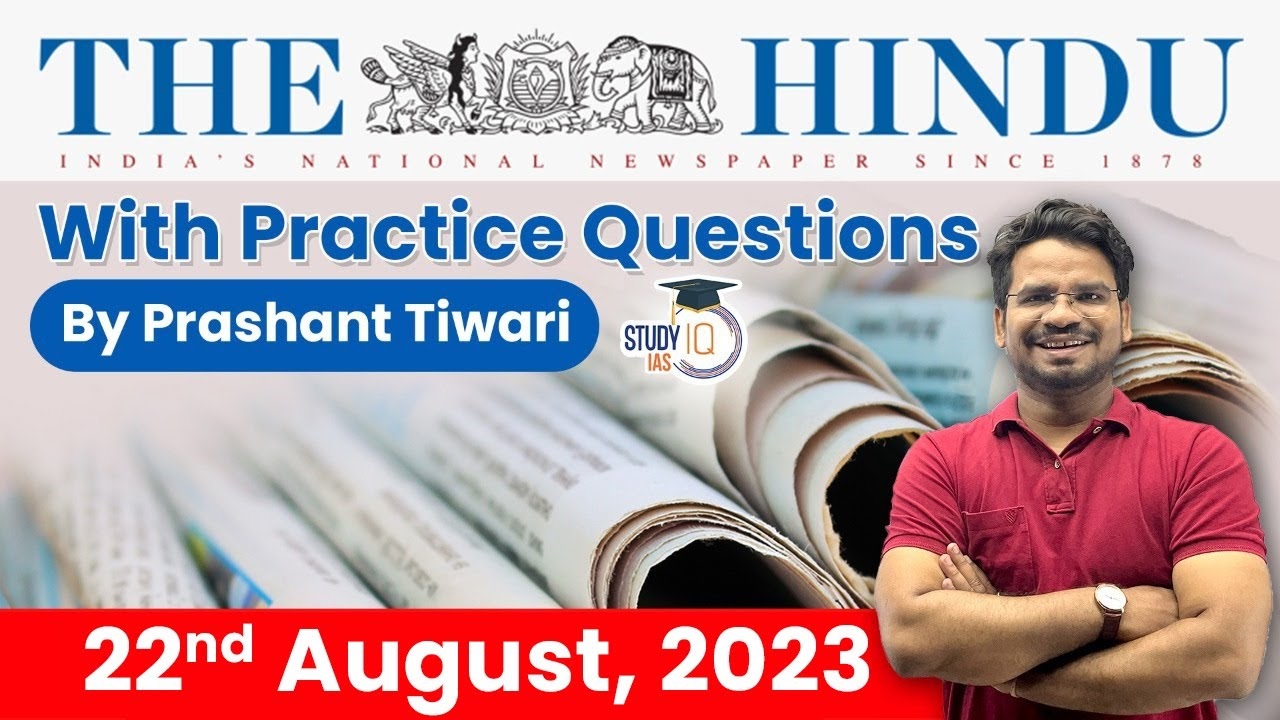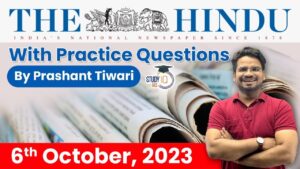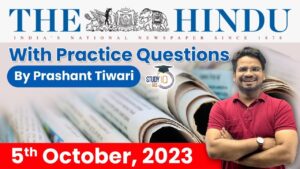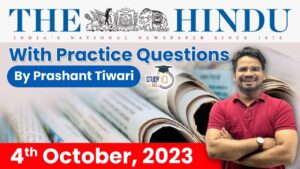The Hindu Newspaper Analysis for UPSC

The Hindu Newspaper Analysis 21 August 2023
- Chief Justice of India D.Y. Chandrachud on Monday assured Tamil Nadu that he would constitute a Bench to hear the State’s plea for the release of its allotment of Cauvery river water for August. Lawyers of the State told The Hindu that the Bench had not been formed yet, and it might be done on Tuesday.
- Tamil Nadu has moved the Supreme Court seeking a direction to Karnataka to release 24,000 cusecs of Cauvery water forthwith from its reservoirs at Billigundulu for the remaining period of the month, starting from August 14.
- The State said the release of water was a dire necessity to meet the pressing demands of the standing crops.

- Cauvery Water Dispute
- The dispute is related to a long-standing conflict over the sharing of water from the Cauvery River.
- It involves 3 states and one Union Territory: Tamil Nadu, Kerala, Karnataka and Puducherry.
- The dispute revolves around how the river water should be distributed among these states for various uses, including irrigation, drinking water, and industrial purposes.
- Background
- This dispute originated for the first-time way back in 1892 at the time of Britishers between the Presidency of Madras and Princely state of Mysore.
- In 1924 Mysore and Madras reached into an agreement which will be valid for 50 years. Hence, it ceased to be enforced in 1974.
- Since 1974, Karnataka started diverting water into its four newly made reservoirs, without the consent of Tamil Nadu.
- This resulted in dispute in post independent India.
- Formation of Cauvery Water Disputes Tribunal and its final award
- In accordance with Section 4 of the Inter-State Water Disputes Act, 1956, the Cauvery Water Disputes Tribunal (CWDT) was formed in June 1990.
- After 17 years, the CWDT issued its final award in February 2007, specifying the amount of water that each state should receive during different periods of the year.
- The government again took 6 year and notified the order in 2013 on the direction of the Supreme Court.
- Later, Tamil Nadu government had approached the Supreme Court.


- The 60-member Manipur Assembly failed to hold a Special Session on Monday to discuss the ethnic violence in the State as the Raj Bhavan did not issue a notification to convene it despite a recommendation from the State Cabinet.
- An official statement on August 4 said the Cabinet had recommended to Governor Anusuiya Uikey the summoning of the fourth session of the 12th Manipur Legislative Assembly on August 21. This followed a similar request from the government on July 27.
- The next session has to be held before September 2. Article 174 of the Constitution says: “The House or Houses of the Legislature of the State shall be summoned to meet twice at least in every year, and six months shall not intervene between their last sitting in one session and the date appointed for their first sitting in the next session.”
- It is unlikely that the Governor is unaware of the constitutional position that she is bound by the advice of the government with regard to summoning the Assembly. A Constitution Bench had made this clear in Nabam Rebia (2016).

- The upcoming BRICS (Brazil, Russia, India, China, and South Africa) summit in South Africa, from August 22 to August 24, will be an important stress test for Indian diplomacy, and a harbinger of the shape of geopolitics to come.
- BRICS, after all, is also more globally represented than the UN Security Council (UNSC) and the G-7, though less than the G-20 which is dominated by the West.
- That 40-odd countries have formally or informally expressed interest in joining an expanded BRICS, just five countries today, is reflective of the deeply-held sense of angst and anger in the global South countries about their place in the world.
- Not that BRICS or the Shanghai Cooperation Organisation (SCO) will lead to truly democratic global governance or multipolarity (perhaps nothing can); these forums too are replete with competing interests and calculations including inbuilt or unsaid hierarchies.
- For one, where does India belong in the global geopolitical landscape? There is, for instance, a tendency in the West to view India’s membership of BRICS and the SCO in the context of the Ukraine war and the United States/West versus the standoff with Russia. An oft-repeated question is: “How can India be a part of the Quad [Australia, Japan, the U.S., India], G-20, G-7 and BRICS, SCO and global South at the same time?”
- Developmentally, historically and geographically, India belongs to BRICS, SCO, and the global South. But India does not only belong to them.
- Multipolarity, in the Indian historical imagination, is about equity, inclusion and representation, not bloc rivalry, ideological or otherwise. However, even if New Delhi vehemently opposes bloc politics, it will continue to get drawn into it.
- The question that New Delhi must ask every step of the way as it pursues a multipolar world and alternative mechanisms for global governance is whether (or not) it helps boost the rise of China globally.
- India must, therefore, keep its eyes firmly fixed on its goal: promote a more representative and equitable global governance on the one hand and ensure that such an order does not end up undercutting its own national interests.
- The geopolitical predicament this poses before New Delhi is hardly an easy one to navigate: asserting itself in non-western global forums such as BRICS and the SCO, checking the steadily growing Chinese influence in them, and dealing with western normative expectations while negotiating a place for itself in Eurocentric forums such as the UNSC and the G-7. It must do all this simultaneously.


- Competition rather than cooperation is likely to define the ties between the two neighbours in political, economic and logistical areas
- They were partners in the war in Yemen, worked together to strengthen al-Sisi’s regime in Egypt, viewed Iran as a regional threat, disliked the Muslim Brotherhood, and then collaborated closely to implement the blockade of Qatar.
- In July 2017, the UAE abruptly rejected the proposal to cut oil production put forward by “OPEC +” on the ground that its base production needed to be significantly increased.
- The UAE also expanded its maritime footprint in the region by taking control of Yemeni ports and Socotra Island in the Gulf of Aden, and Perim Island at the mouth of the Bab al-Mandab.
- The UAE also normalised ties with Israel in August 2020, thus publicly dumping the Saudi-sponsored Arab Peace Initiative that requires Israel to accommodate Palestinian interests before Arab states normalise relations. Later, the kingdom initiated the readmission of Syria into the Arab League in May this year, but MbZ failed to attend the summit.
- In Sudan, the two Gulf neighbours are now backing different generals — while the kingdom supports Army chief al-Burhan, the UAE is backing militia leader Dagalo, thus prolonging the destructive civil conflict.

- On August 8, Education Minister Dharmendra Pradhan launched the ‘State of Elementary Education in Rural India’ report which shows that schoolchildren spend most of their screen time playing games, watching movies or listening to songs. Accessing study materials and online tutorials featured way down the order.
- Of the 49.3% of parents whose children used gadgets, 76.7% said that their children mainly used mobile phones to play video games, over 56% said that their children used phones to watch movies, 35% said they used phones to access online materials, and only 19% said they used phones to attend online tutorials.
- Instead of seeing this trend as a cause for concern, it can be viewed as a promising opportunity where education meets entertainment. Traditional media consumption has increasingly transitioned to OTT platforms, which have the ability to make meaningful contributions to reading literacy and language learning.

- Around five years ago, the Government of India decided it wanted more companies to make things in India. It has therefore introduced a key set of incentives through the production-linked incentives (PLI) scheme. Here, the government gives money to foreign or domestic companies that manufacture goods here.
- The industry that has shown the most enthusiasm for the PLI scheme is smartphone manufacturing. And with the scheme, mobile phone exports jumped from $300 million in FY2018 to an astounding $11 billion in FY23.
- However, the former RBI governor contends that while imports of fully put-together mobile phones have come down, the imports of mobile phone components have shot up between FY21 and FY23.


- K. Prime Minister Rishi Sunak recently backed plans for new fossil fuel drilling off Britain’s coast, worrying environment experts.
- Drilling in seas and oceans for fossil fuels not only aggravates the threat of climate change but also warms oceans and raises sea levels.
- In its March 2023 Progress Report to the U.K. Parliament, the Climate Change Committee (CCC), said that the U.K. has not adequately prepared for climate change under the second National Adaptation Programme.
- The 1958 Geneva Convention on the Continental Shelf was the first international legislation to establish the rights of countries over the continental shelves adjacent to their coastlines and paved the way for exploration in the North Sea.


 The Hindu Newspaper Analysis 6 October 2...
The Hindu Newspaper Analysis 6 October 2...
 The Hindu Newspaper Analysis 5 October 2...
The Hindu Newspaper Analysis 5 October 2...
 The Hindu Newspaper Analysis 4 October 2...
The Hindu Newspaper Analysis 4 October 2...





















